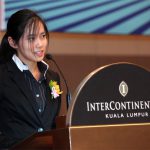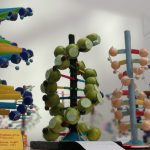May 14-16 2016 – Dr Yap Fei Ling, a Lecturer from the School of Medicine, International Medical University (IMU) won the second prize for poster presentation at the Symposium on Stem Cell and Cancer Research held in Taiwan. The Symposium on Stem Cell and Cancer Research was one of the leading international events gathering world-class scientists and experts engaged in the field of stem cells and cancer research. This event also represented a unique opportunity to involve all researchers in the global stem cell community and to contribute collectively towards achieving the mission of eliminating cancer as a life-threating disease for future generations. Interesting scientific sessions of the symposium include Stem Cell Epigenetic and Reprogramming, Clinical Trials and Regulatory Affairs, Bone, Cartilage and Soft Tissues Engineering, Stem Cells Tools to Battle Cancer, Targeting Mitochondria: Recent Clinical & Potential Therapeutic Studies, and 3D Printing & Other Medical Devices in Clinical Applications. Apart from Taiwan, the invited speakers were from USA, Mexico, Germany, China, Japan, Hong Kong, Korea and Singapore.
Dr Yap Fei Ling presented a poster titled Effects of Mesenchymal Stem Cells on Breast Cancer Growth in 2D and 3D Culture System at the Symposium. Mesenchymal stem cells (MSCs) are adult stem cells which can differentiate into certain cell types, in other words to produce more than one type of specialised cell of the body. Owing to controversial findings from previous works, the primary aim of the project was to study the uncertain effect of MSCs on tumour growth, especially breast cancer using two-dimensional (2D) and three-dimensional (3D) culture systems.
Cell culture systems are tools used in a wide range of basic and clinical in vitro research studies to cultivate cells. There are two types of systems, namely 2D and 3D culture systems. 2D system is the conventional way of growing cells on a petri dish and cells are grown in monolayers. However, such culture systems do not reflect the situation in vivo. Therefore, 3D culture system was introduced to create an artificial environment in which the cells can grow or interact with their surroundings in all three dimensions. 3D system more mimics and simulates the in vivo conditions which are the ideal environment for cells to grow. From the study, Dr Yap Fei Ling found out that proliferation of human breast cancer cells namely MCF-7, MDA-MB-231 and T-47D in 2D system was inhibited. Direct cell-to-cell contact may play important roles on anti-proliferative effect of MSCs in 2D culture. On the contrary, enhanced growth of all breast cancer cells were noted when the same breast cancer lines were co-cultured with MSCs in 3D culture system. Significant proliferation was shown when these cells were cultured in MSC conditioned medium, suggesting soluble factors released by MSCs, instead of stem cells themselves are more crucial in affecting the growth of breast cancer.
This study has been beneficial to the medical world as it suggests that MSCs have contradictory effects on breast cancer growth when cultured in 2D and 3D systems, respectively and has provided new insights into the effects of MSCs on proliferative and functional behavior of breast cancer cell lines. The potential of using MSCs in clinical treatments or new therapeutic strategies is worth exploring.
Congratulations to Dr Yap Fei Ling for getting the award!








